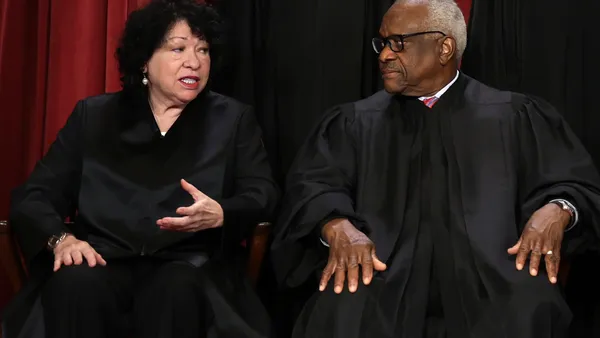UPDATE: September 18, 2020: The U.S. House of Representatives passed the Pregnant Workers Fairness Act on Sept. 17 by a 329-73 vote.
Dive Brief:
- Federal lawmakers advanced a bill Jan. 14 that would create additional protections for pregnant workers. It now moves to the House floor for a vote.
- H.R. 2694, also known as the Pregnant Workers Fairness Act (PWFA), would require private sector employers with 15 or more employees (as well as public sector employers) to make reasonable accommodations for job applicants and employees with known limitations related to pregnancy, childbirth or related medical conditions, unless such accommodations would impose an undue hardship on the employer.
- Under the proposal, "pregnant workers and individuals with known limitations related to pregnancy, childbirth, or related medical conditions cannot be denied employment opportunities, retaliated against for requesting a reasonable accommodation, or forced to take paid or unpaid leave if another reasonable accommodation is available," according to a statement from the House Committee on Education and Labor.
Dive Insight:
If passed in both houses, the PWFA would be a major update to federal protections for pregnant workers and job applicants under the Pregnancy Discrimination Act (PDA) as well as the Family and Medical Leave Act and Americans with Disabilities Act.
The PDA prohibits sex discrimination on the basis of pregnancy, but does not explicitly state that employers must provide reasonable accommodations to pregnant workers. However, in Young v. United Parcel Service, the U.S. Supreme Court held that the PDA requires employers to treat pregnant employees "the same for all employment-related purposes, including receipt of benefits under fringe benefit programs, as other persons not so affected but similar in their ability or inability to work." Essentially, if an employer offers an accommodation to non-pregnant employees, it must articulate a non-discriminatory reason for refusing to offer the same accommodation to a pregnant employee, experts previously told HR Dive.
But the precedent set in Young has led to pregnant workers being denied accommodations due to an "unreasonably high standard for proving discrimination," according to the House committee. "As workers continue to suffer pregnancy discrimination at an alarming rate, we must ensure that all pregnant workers, no matter where they live, can access the protections they need to stay healthy on the job," Rep. Bobby Scott, D-Va., the committee's chair, said in the statement.
The PWFA has gained support not only from Republicans and Democrats but also from a wide range of interest groups. A letter sent to Scott's office Jan. 13 by organizations including the U.S. Chamber of Commerce, the National Women's Law Center and the American Civil Liberties Union called the PWFA "a balanced approach to ensuring that pregnant employees have the maximum opportunity to stay in the workplace."
In the past year, several organizations facing litigation by the U.S. Equal Employment Opportunity Commission over alleged pregnancy discrimination have opted to enter settlement agreements. Such was the case for medical documentation service Scribe-X Northwest, which paid $80,000 to settle claims that it rescinded an employment offer from a candidate after discovering she was pregnant.
At the same time, HR teams should be careful about instituting policies for pregnant employees that may seem helpful, but perpetuate what one group of researchers termed "benevolent sexism." Shielding pregnant workers from things like unpleasant news or assigning them lighter workloads may make those workers feel worse about their own abilities, the researchers said — and can amount to discrimination.
Employers also can help to ensure a smooth transition for employees returning to the workforce following a pregnancy in part by offering breaks and private spaces for breastfeeding and/or pumping.













